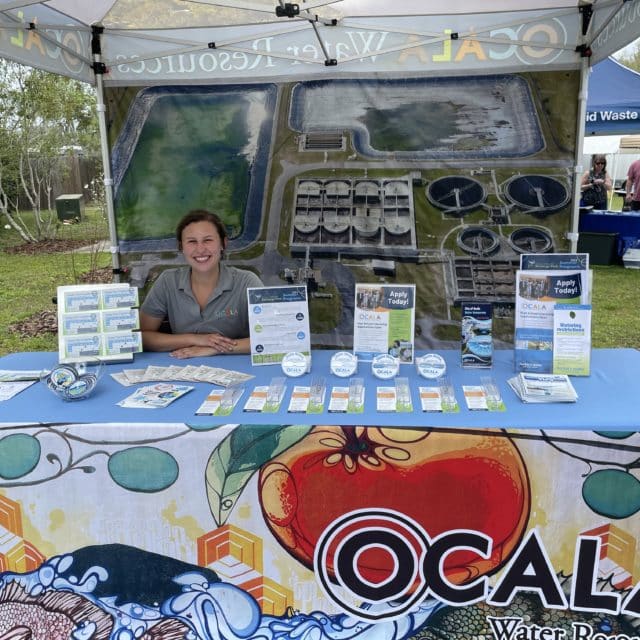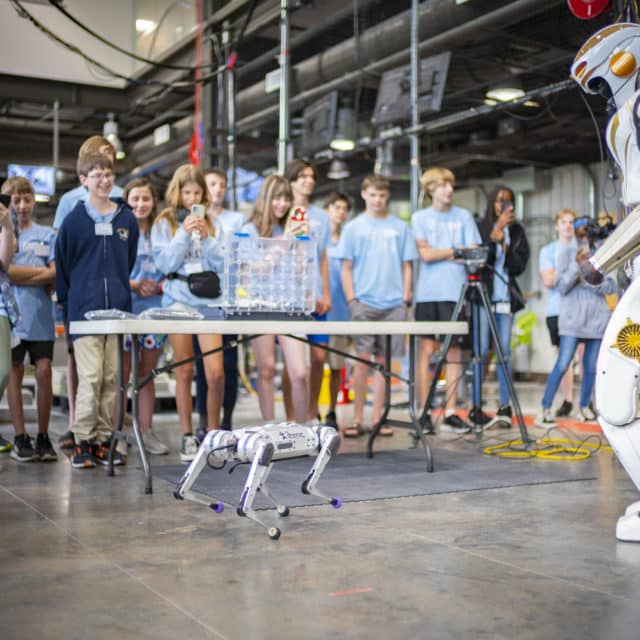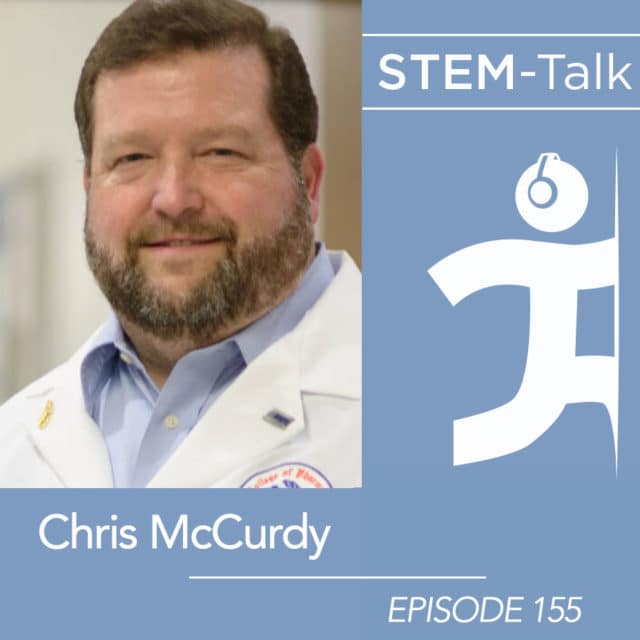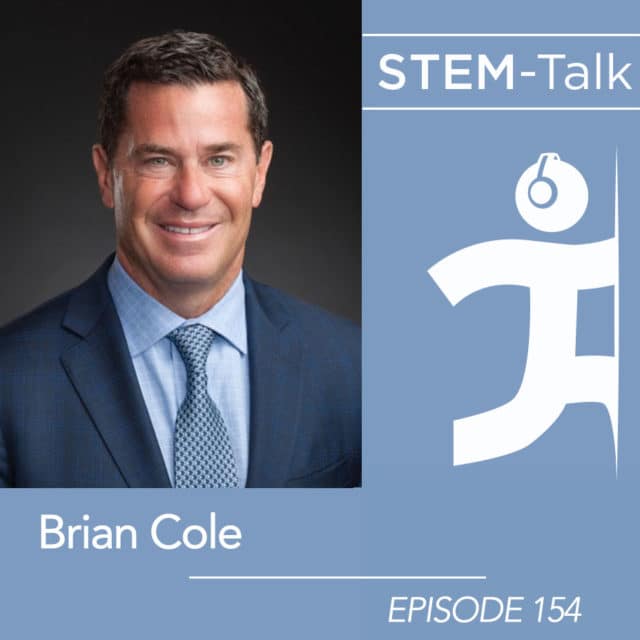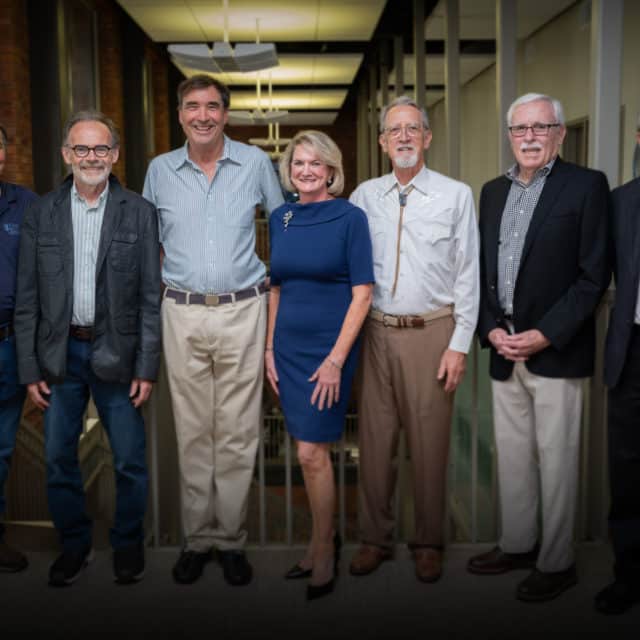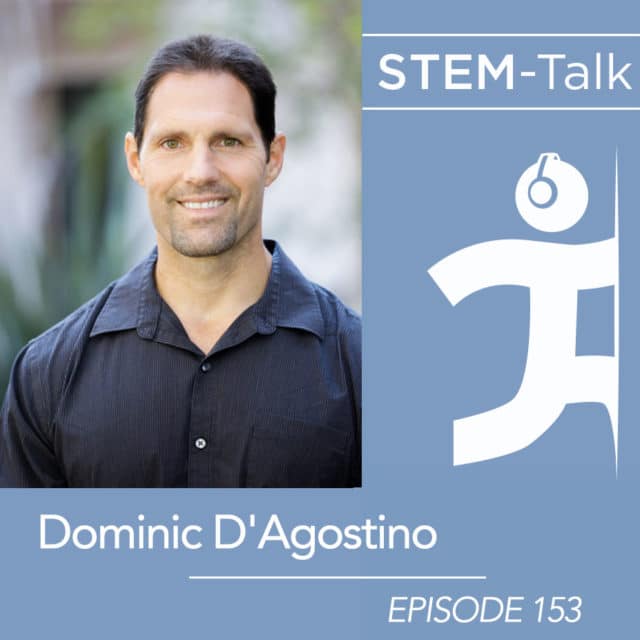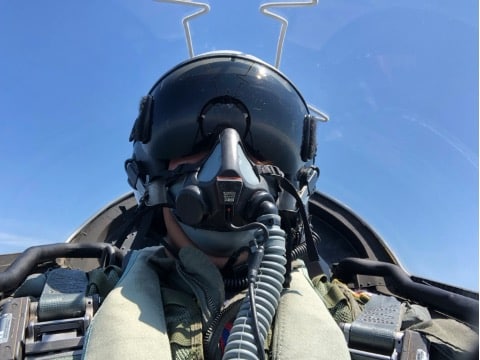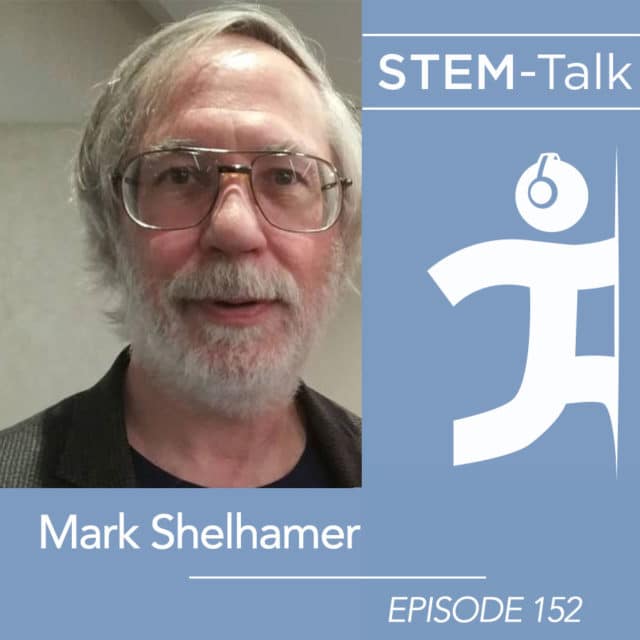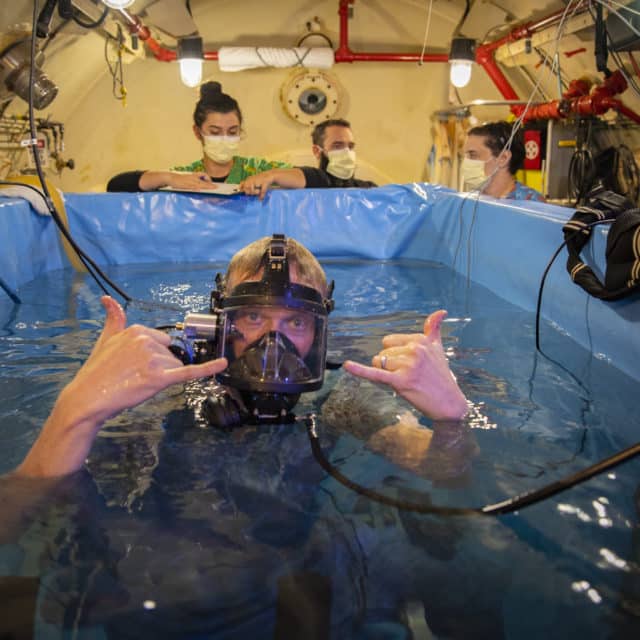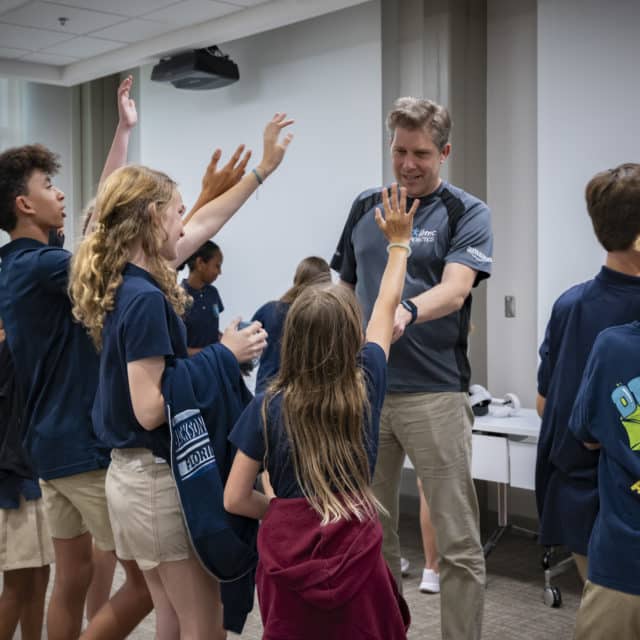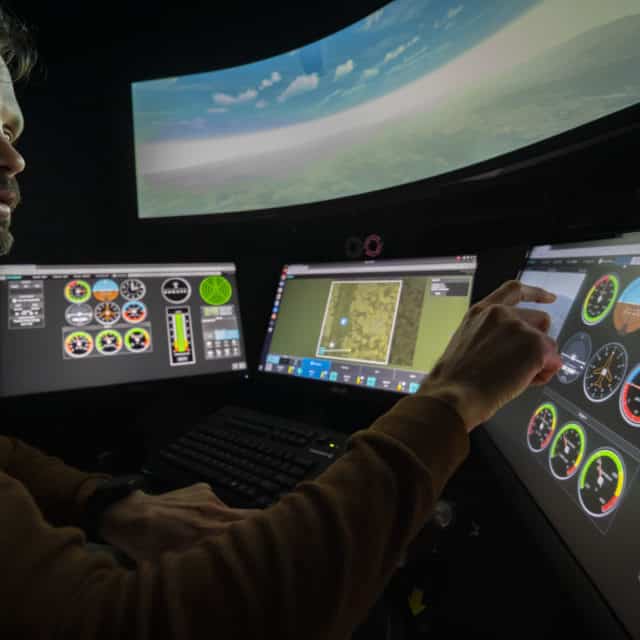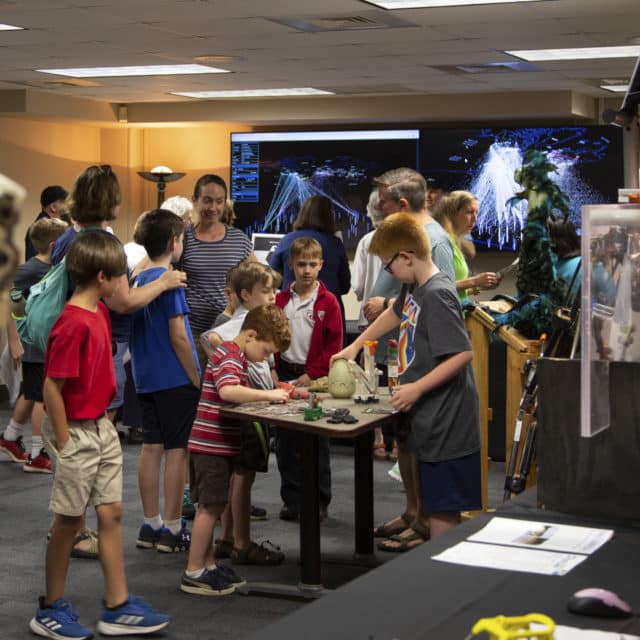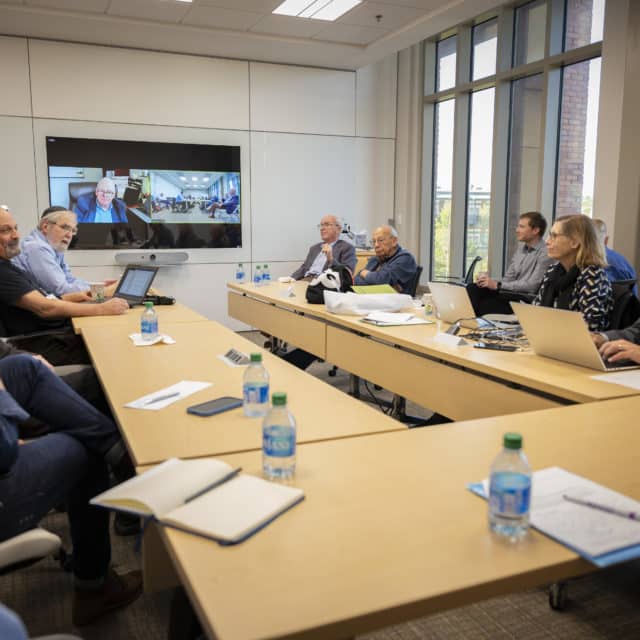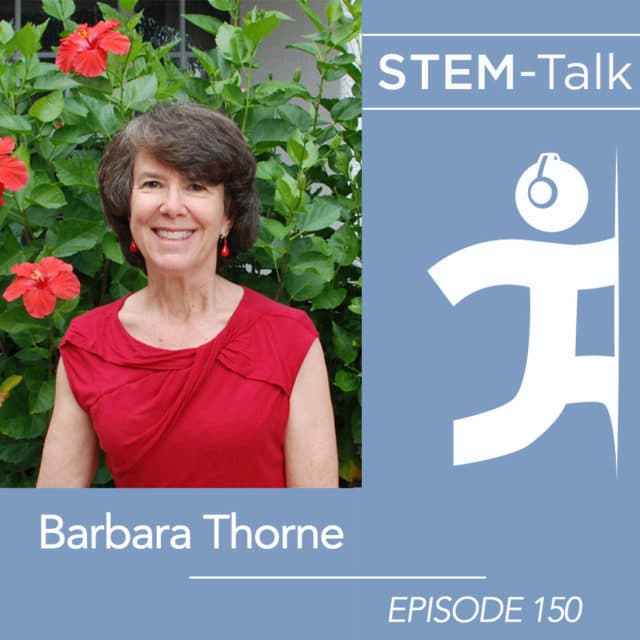Back-to-school means back to Science Saturdays at IHMC
Published 8.17.23 The Florida Institute for Human and Machine Cognition is where Gabriela Sullivan’s passion for science education flourished. This fall, she’s coming back to share it with the next generation. As a high schooler, Sullivan was a regular volunteer at IHMC’s Science Saturdays STEM enrichment program for students in grades 3 through 6. She remembers being in awe of the researchers and teachers who could encourage and inspire a room full of young minds. “Their ability to convey complex concepts in a way that was both understandable and exciting fascinated me,” she said. “It made me want a career… Read More
Robotics Camp fires students’ STEM excitement through hands-on learning
Published 8.2.23 This summer, the ordinarily quiet classrooms of the Florida Institute for Human and Machine Cognition’s Pensacola and Ocala campuses became engineering playgrounds as part of 2023 Summer Robotics Camp. Over the course of four, one-week sessions, 66 middle and high schoolers got these hands-on experiences and more designing their own LEGO robots, learning the basics of computer programming, and interacting with researchers. “We are reaching out to the next generation of scientists, helping them to discover what their future might look like,” said Dr. Ursula Schwuttke, IHMC’s Director of Educational Outreach. Any future in STEM requires strong teamwork… Read More
STEM-Talk: Dr. Chris McCurdy on kratom and pain management
Published 7.21.23 What if the roots of a secret to treating chronic pain has lain for centuries in the tree leaves of a Southeast Asian evergreen? Dr. Chris McCurdy has spent the last 15 years of his career researching that question, with a focus on the medical efficacy of kratom and its alkaloids. Now, he’s back on STEM-Talk after five years to share what he and his lab at the University of Florida have learned since his 2018 interview on episode 61. McCurdy and his lab received two major grants from the National Institute of Drug Abuse to investigate kratom… Read More
IHMC researchers collaborating with American Magic team
Published 7.14.23 New York Yacht Club American Magic’s move to Pensacola has resulted in a collaboration with the Florida Institute for Human and Machine Cognition (IHMC). Since 2018, the professional sailing team has used the Port of Pensacola for seasonal training. In 2023, they decided to make Pensacola their permanent home. This strategic move is expected to generate 170 jobs in advanced manufacturing, engineering, design, and high-tech research and development. The collaboration originated when Pensacola Mayor D.C. Reeves included IHMC on a city tour with the racing team. “Soon after this introduction, members of the IHMC team toured the American… Read More
STEM-Talk: Dr. Brian Cole on advances in knee, shoulder, and elbow injuries
Published 6.28.23 You can thank Bob Newhart for Dr. Brain Cole’s career. The classic 1970s sitcom gave Cole, then an impressionable middle schooler, a vision of the impact a physician could have on the lives of patients with good humor. “If you ask any individual in health care, the reason I chose this is I love to help people,” Cole says on the latest episode of STEM-Talk. “On ‘The Bob Newhart Show’ he was able to help people, but he did so with a sense of humor.” Something about the low-key way that psychology, sociology and humor fit together to… Read More
IHMC honors seven colleagues with emeritus status
Published 6.15.23 At the Florida Institute for Human and Machine Cognition (IHMC), we stand on the shoulders of those who have come before us. This month, IHMC honored seven people who helped build the Institute from a closet in the computer science department at the University of West Florida into a research center with an international reputation in artificial intelligence, computer science, robotics and exoskeletons, and healthspan, resilience, and performance research. “Without the contributions of these individuals, IHMC quite simply would not be where it is today,” said Founder and CEO Dr. Ken Ford. “Their own sense of commitment… Read More
STEM-Talk: Dominic D’Agostino on latest research into therapeutic ketosis
Published 6.13.23 Longtime listeners know Dr. Dominic D’Agostino’s reputation and his research into the physiological benefits of nutritional ketosis. Since his last STEM-Talk in 2019, a tremendous body of research has been added to the literature about the therapeutic potential of ketosis. Listen to Episode 153 now or wherever you listen to podcasts. The high-fat, low-carb ketogenic diet has been linked to advances in the treatment of: • Alzheimer’s • Cancer • Migraines • Type-2 diabetes • Psoriasis • Sleep apnea • Psychiatric disorders • Traumatic brain injuries • And a host of other diseases and disorders, which we cover… Read More
Retired Air Force Maj. Brian Shul leaves legacy of survival with his passing
Published 6.6.23 “Leaving your jet in the jungle is not heroic. I’m a survivor.” That sentiment is one that Retired Air Force Maj. Brian Shul expressed often in the years after being shot down during the Vietnam War. Sustaining devastating burn injuries in the crash, he recovered and continued to serve his country, piloting secret missions in the Cold War while flying the SR-71, the world’s fastest aircraft. He told his story often as part of his encore career in which he continued to inspire. Telling his story was among the last things he did. He died of a cardiac… Read More
A2PEX project leads latest edition of IHMC newsletter
Published 5.19.23 How long can you sustain attention in a cognitively or physically demanding situation where a lapse in focus due to boredom or fatigue could have life-or-death consequences? That’s the question at the heart of a cooperative research project between the Florida Institute for Human and Machine Cognition (IHMC) and the Air Force Research Laboratory (AFRL) now under way. The project is the cover story of the latest issue of our newsletter, available here. Assessing and Augmenting Performance in Extreme Environments (A2PEX) aims for real-time assessment and augmentation of Airmen cognitive performance in long-duration missions in extreme environments. The… Read More
STEM-Talk: Dr. Mark Shelhamer on human spaceflight and missions to Mars
Published 5.18.23 Mark Shelhamer was set upon a path that would take him from “nerdy band kid” to the chief scientist for NASA’s Human Research Program by his Uncle Stanley. “One of the smartest people I knew, even though he was not highly educated,” Shelhamer says. “He had been a surveyor in a coal mine. He was ‘the cool uncle,’ so he made it cool to be interested in science and math.” Uncle Stanley also gifted 10-year-old Mark with a Radio Shack 150-in-1 Electronics Kit. The idea that he could wire up a radio in a few minutes and… Read More
IHMC supports veterans’ transition to civilian work through SkillBridge program
Published 5.8.23 The transition from military to civilian life comes with challenges, including how to translate that experience into the civilian workplace. The Florida Institute for Human and Machine Cognition is proud to be part of a U.S. Department of Defense (DoD) program to help close that gap. SkillBridge is a DoD program to give military personnel civilian work experience in the last 180 days of their service career — a bridge from one world to the next. This spring, IHMC renewed its commitment to the program becoming a SkillBridge worksite. The DoD covers salary and benefits while in the… Read More
Team crafts tool to track neurological function in divers for Office of Naval Research
Published 5.4.23 An IHMC team has wrapped up a three-year project refining an underwater eye-tracking tool to detect the early signs of neurological hazards in divers. Neurologic decompression sickness, hypoxia, hypercarbia, and Central Nervous System (CNS) O2 toxicity, all are hazards of working in undersea environments. Small eye-movement cameras, known as video-oculographic (VOG) systems, have been used extensively for clinical assessment of eye movements, a quantifiable marker of neurologic function. In a project supported by the Office of Naval Research Undersea Medicine Program, the IHMC team modified the Pupil Labs ocular camera system into a waterproof form that fits in… Read More
Bayou Texar project recruited residents for watershed monitoring
Published 5.2.23 Florida Institute for Human and Machine Cognition research also includes small scale efforts in local efforts. One such example is work by IHMC Research Scientist David Fries, who is using Bayou Texar as a test bed for a project to enlist residents in tracking the bayou’s health. It is a timely project that complements ongoing efforts to improve the waterway, which includes a nearly $6 million grant, announced by the City of Pensacola in November 2022. With two grants totaling $100,000 from the Pensacola & Perdido Bays Estuary Program Community Grant Program, Fries launched a citizen science… Read More
STEM-Talk: Dr. John Ioannidis on flaws in COVID-19 response
Published 4.19.23 In the early days of the COVID-19 pandemic, Dr. John Ioannidis wrote an article in March 2020 questioning government statistics about the fatality rate of COVID-19. The backlash was swift and brutal, and John’s reputation as one of the most influential scientists in the world took a beating. Here, John makes his second appearance on STEM-Talk to discuss his extensive research into the pandemic. Episode 151 is available now on our podcast page, as well as in popular podcast apps and on YouTube. John talks about his most recent peer-reviewed paper that looked at the age-stratified infection… Read More
Triumph Gulf Coast funding supports IHMC purchase of cutting-edge gene sequencer
Published 4.17.23 IHMC is purchasing a new NovaSeq X Plus genetic sequencing device that will help elevate the Institute’s footprint as a regional hub of excellence in human performance research. IHMC will be among the first labs in the country to have the newest version of this device, which allows for next-generation sequencing capacity to better understand genetics, genomics, epigenetics, and transcriptomics. “The information contained in our genes and how they are activated and regulated is extremely important in understanding risks of disease, along with differences between individuals and the responses of each person to a treatment or exposure to… Read More
WATCH: 2023 IHMC Robotics Open House
Published 4.14.23 Everyone likes company — and IHMC is no exception. More than 350 people came through our doors for 2023’s Robotics Open House. The family-friendly event allowed IHMC researchers to share some of what they do with students and families. We had a great time showcasing our work in robotics, virtual reality experiences, human performance research projects, data visualization, and more. If you couldn’t be there, here’s a little of what you missed. For students to get an IHMC experience, we have two upcoming opportunities: Science Saturday on April 22 for students in grades 3-6, and summer Robotics Camp… Read More
IHMC researchers to help build testing environment to improve operator awareness.
Published 4.10.23 IHMC received nearly $4 million in grant funding as a subaward to SRI International’s “PROTEUS: Prototype Testing environment for User Situation awareness.” PROTEUS is a rapidly reconfigurable human-machine interface (HMI) testing environment for early and cost-effective testing of human machine prototypes, specifically those designed to improve operator situation awareness and support agile adaptation to off-nominal situations. The PROTEUS Team is a project the Defense Advanced Research Projects Agency and is a collaboration between SRI International (prime, headquartered in Menlo Park, CA), IHMC, and SkillMil, Inc., (Menlo Park, CA). IHMC’s effort is led by Senior Research Scientist Dr. Anil… Read More
IHMC celebrates National Robotics Week with open house on April 6
Published 3.31.23 It’s time to get your peek behind the curtain. On April 6, Florida IHMC is inviting the public to meet Nadia, Valkyrie, Eva, Mini Cheetah, Wasp and the humans behind them in celebration of National Robotics Week. From 3 to 7 p.m. on April 6, 2023, researchers at the Institute for Human and Machine Cognition will welcome the public and students for tours, walk-throughs and inspiration on the Pensacola campus on South Alcaniz Street. The last tour begins at 7 p.m. The family-friendly event encourages scientific discovery through hands-on activities, challenges, and demonstrations while providing the opportunity to… Read More
Experts in spatial disorientation review innovations to mitigate risks of aviation mishaps
Published 3.28.23 Recently, the Florida Institute for Human and Machine Cognition hosted a gathering of international experts in spatial disorientation, the leading cause of deadly mishaps in military and commercial aviation. Over three days in late March, 87 members of the Spatial Orientation Modeling Expert (SOME) Workgroup shared the latest techniques to model spatial disorientation mishaps and to showcase the latest developments designed to mitigate the risk. The hope is to craft recommendations for future research on the model and designs of next-generation aerospace vehicles to improve pilot situation awareness and counter spatial disorientation. The Principal Investigator from… Read More
STEM-Talk: Dr. Barbara Thorne, conehead termite expert, on biology, control of these highly social insects
Published 3.21.23 STEM-Talk episode 150 featuring termite biologist Dr. Barbra Thorne is now available on IHMC’s website as well as popular podcast apps. In her interview, Barbara talks about the invasive conehead species, a Central and South American termite that has invaded South Florida. Barbara is a research professor and professor emerita in the Department of Entomology at the University of Maryland. Since 2012 she has served as the Florida Department of Agriculture and Consumer Services science advisor on the state’s Conehead Termite Program. She also chairs the National Scientific Advisory Committee for the Conehead Termite Program. Barbara’s research focuses… Read More


